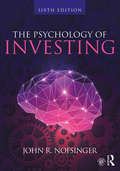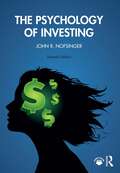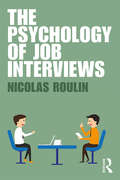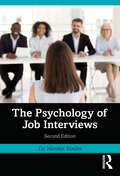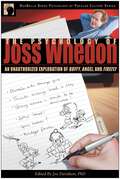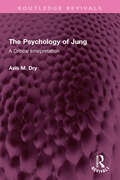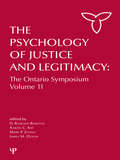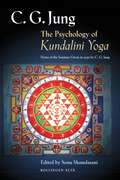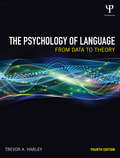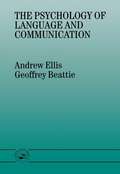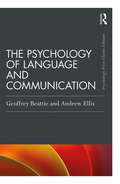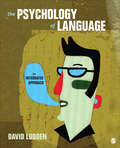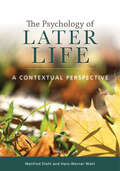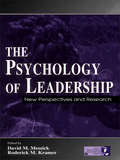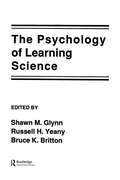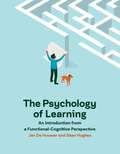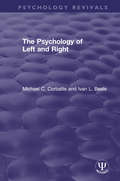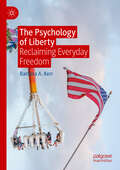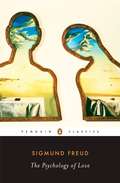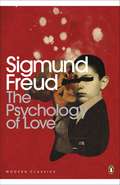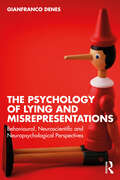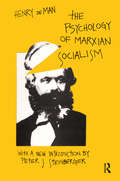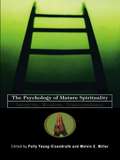- Table View
- List View
The Psychology of Investing
by John R. NofsingerWhile traditional finance focuses on the tools used to optimize return and minimize risk, this book explains how psychology can affect our decisions more than financial theory. Covering the ways investors actually behave, this is the first book of its kind to delve into the ways biases influence investment behavior, and how overcoming these biases can increase financial success. Now in its sixth edition, this classic text features: An easy-to-understand structure, illustrating psychological biases as everyday behavior; analyzing their effect on investment decisions; and concluding with academic studies that exhibit real-life investors making choices that hurt their wealth. A new chapter on the biology of investment, exploring the latest research on genetics, neuroscience, and how hormones, aging, and nature versus nurture inform our investment behavior. An additional strategy for controlling biases, helping readers understand the psychology that motivates markets and how to address it. Experiential examples, chapter summaries, and end-of-chapter discussion questions to help readers test their practical understanding. Fully updated with the latest research in the field, The Psychology of Investing will prove fascinating and educational for advanced students in investment, portfolio management, and behavioral finance classes as well as investors and financial planners.
The Psychology of Investing
by John R. NofsingerWhile traditional finance focuses on the tools used to optimize return and minimize risk, this book shows how psychology can explain our decisions more than financial theory. Analyzing how investors behave in the real world, this is the first book of its kind to delve into the ways biases influence investment behavior, and how overcoming these biases can increase financial success. Now in its seventh edition, this classic text features: An easy-to-understand structure, illustrating psychological biases as everyday behavior; analyzing their effect on investment decisions; and concluding with academic studies that show real-life investors making choices that hurt their wealth New content on fintech and cryptocurrencies, the role of social media in investing, generational biases, and the COVID-19 pandemic Experiential examples, chapter summaries, and end-of-chapter discussion questions to help readers test their practical understanding Online supplements comprising PowerPoint slides for both students and lecturers Fully updated with the latest research in the field, The Psychology of Investing will prove fascinating and educational for advanced students in behavioral finance, investment and portfolio management classes, as well as investors and financial planners.
The Psychology of Job Interviews
by Nicolas RoulinMost people, at some point in their lives, experience the stress of being interviewed for a job they want. Many also face the challenge of interviewing other people. But what does the science tell us about this unique social situation? What biases are involved, and how can we become aware of them? And how can job interviews be structured so that they are fair and effective? The Psychology of Job Interviews is the first book to provide an accessible and concise overview of what we know. Based on empirical research rather than second hand advice, it discusses the strategies and tactics that both applicants and interviewers can use to make their interviews more successful; from how to make a good first impression to how to decide which candidate is the best fit for the role. Illustrated with examples throughout, the book guides job applicants on how best to prepare for and perform in an interview, and provides managers with best-practice advice in selecting the right candidate. Debunking several popular myths along the way, this is essential reading for anyone interested in understanding what is really happening in a job interview, whichever side of the desk you are sitting.
The Psychology of Job Interviews
by Nicolas RoulinMost people, at some point in their lives, experience the stress of being interviewed for a job. Many also face the task of interviewing other people. But what does the science tell us about this unique social situation? What biases are involved, and how can we become aware of them? And how can job interviews be structured so that they are fair and effective? This second edition of The Psychology of Job Interviews provides an accessible and concise overview of what we know. Based on empirical research rather than secondhand advice, it discusses the strategies and tactics that both applicants and interviewers can use to make their interviews more successful; from how to make a good first impression to how to decide which candidate is the best fit for the role. Updated throughout, this timely new edition comes with an additional chapter focused on technology in interviewing. Also featuring the addition of a new "Toolbox" at the end of chapters with practical summaries, tools, advice, and concrete examples, the book guides job applicants on how best to prepare for and perform in an interview and provides managers with best-practice advice in selecting the right candidate. Debunking several popular myths along the way, this is essential reading for anyone interested in understanding what is really happening in a job interview, whichever side of the desk you are sitting.
The Psychology of Joss Whedon: An Unauthorized Exploration of Buffy, Angel, and Firefly
by Leah Wilson Joy DavidsonFirst there was &“Buffy the Vampire Slayer"; then its spin-off &“Angel"; then the cult hit &“Firefly"; and its follow-up film, &“Serenity." They all had two things in common: their creator, Joss Whedon … and their surprising psychological depth. Revisit the worlds of Joss Whedon … with trained psychologists at your side. What are the psychological effects of constantly fighting for your life? Why is neuroscience the Whedonverse's most terrifying villain? How can watching Joss's shows help you take on your own psychological issues? It's all the best parts of Psych 101—without Professor Walsh. * Robert Kurzban explains how Mal's morals are a form of evolutionary pornography, and why we like to watch * Thomas Flamson explores free will in the Whedonverse—with prophecies, sacred duties and the long arm of the Alliance, does anyone actually have any? * Carole Poole demonstrates how Buffy and Spike's season six relationship could be considered metaphor for narcissistic personality disorder—and concludes that Buffy may have been better off continuing it * Bradley J. Daniels looks at River's Alliance-altered brain, and the real effects of &“stripping" the amygdala * Mikhail Lyubansky shows why, psychologically, death really is Buffy's gift * And editor Joy Davidson takes on Angel's mommy issues—how the course of his whole extraordinary existence can be traced back to the woman who made him a vampire
The Psychology of Jung: A Critical Interpretation (Psychology Revivals)
by Avis M. DryFirst published in 1961 The Psychology of Jung presents a critical and historical interpretation of Carl Jung’s psychology. In this book the author describes himself as an ‘independent student’ and as an ‘interested, though uncommitted observer’ and attempts to explain and reconcile drawbacks, contradictions, discrepancies and incongruities of Jungian theory, in particular, its indefiniteness, its mystical, semireligious characteristics, its emphasis on visual imagery and mythological symbolisms. It brings themes like historical background; early and intermediate period; the Jungian therapy and related insights; Jung’s critique of Freud and Psychotherapy; changes in Jung’s work and its appeal; and Jungian psychology and its appeal. This is a must read for students of psychoanalysis and psychology.
The Psychology of Justice and Legitimacy (Ontario Symposia on Personality and Social Psychology Series)
by James M. Olson Mark P. Zanna D. Ramona Bobocel Aaron C. KayIn response to the international turmoil, violence, and increasing ideological polarization, social psychological interest in the topics of legitimacy and social justice has blossomed considerably. Social psychologists have explored the psychological underpinnings of people’s reactions to injustice and illegitimacy, including the behavioral and psychological consequences of the motivation to view individual outcomes and governmental systems as just and legitimate. Although injustice and illegitimacy are clearly related at conceptual and theoretical levels, these two rich literatures are rarely integrated. Social justice researchers have focused on how people make sense of particular instances of injustice, whereas legitimacy researchers have tended to focus primarily on people’s reactions to unfair systems of intergroup relations. This 11th volume of the Ontario Symposium series brings together the work of leading researchers in fields of social justice and legitimacy to facilitate the cross-pollination and integration of these fields. The contributions address broad theoretical issues and cutting-edge empirical advances, while illustrating the diversity and richness of research in the two fields. By uniting these two domains, this volume will stimulate new directions in theory and research that seek to explain how and why people make sense of injustice at all levels of analysis.
The Psychology of Kundalini Yoga: Notes of the Seminar Given in 1932 (Jung Extracts #26)
by C. G. Jung"Kundalini yoga presented Jung with a model of something that was almost completely lacking in Western psychology--an account of the development phases of higher consciousness.... Jung's insistence on the psychogenic and symbolic significance of such states is even more timely now than then. As R. D. Laing stated... 'It was Jung who broke the ground here, but few followed him.'"--From the introduction by Sonu Shamdasani Jung's seminar on Kundalini yoga, presented to the Psychological Club in Zurich in 1932, has been widely regarded as a milestone in the psychological understanding of Eastern thought and of the symbolic transformations of inner experience. Kundalini yoga presented Jung with a model for the developmental phases of higher consciousness, and he interpreted its symbols in terms of the process of individuation. With sensitivity toward a new generation's interest in alternative religions and psychological exploration, Sonu Shamdasani has brought together the lectures and discussions from this seminar. In this volume, he re-creates for today's reader the fascination with which many intellectuals of prewar Europe regarded Eastern spirituality as they discovered more and more of its resources, from yoga to tantric texts. Reconstructing this seminar through new documentation, Shamdasani explains, in his introduction, why Jung thought that the comprehension of Eastern thought was essential if Western psychology was to develop. He goes on to orient today's audience toward an appreciation of some of the questions that stirred the minds of Jung and his seminar group: What is the relation between Eastern schools of liberation and Western psychotherapy? What connection is there between esoteric religious traditions and spontaneous individual experience? What light do the symbols of Kundalini yoga shed on conditions diagnosed as psychotic? Not only were these questions important to analysts in the 1930s but, as Shamdasani stresses, they continue to have psychological relevance for readers on the threshold of the twenty-first century. This volume also offers newly translated material from Jung's German language seminars, a seminar by the indologist Wilhelm Hauer presented in conjunction with that of Jung, illustrations of the cakras, and Sir John Woodroffe's classic translation of the tantric text, the Sat-cakra Nirupana. ?
The Psychology of Language
by Trevor A. HarleyNow in full colour, this fully revised edition of the best-selling textbook provides an up-to-date and comprehensive introduction to the psychology of language for undergraduates, postgraduates, and researchers. It contains everything the student needs to know about how we acquire, understand, produce, and store language. Whilst maintaining both the structure of the previous editions and the emphasis on cognitive processing, this fourth edition has been thoroughly updated to include: the latest research, including recent results from the fast-moving field of brain imaging and studies updated coverage of key ideas and models an expanded glossary more real-life examples and illustrations. The Psychology of Language, Fourth Edition is praised for describing complex ideas in a clear and approachable style, and assumes no prior knowledge other than a grounding in the basic concepts of cognitive psychology. It will be essential reading for advanced undergraduate and graduate students of cognition, psycholinguistics, or the psychology of language. It will also be useful for those on speech and language therapy courses. The book is supported by a companion website featuring a range of helpful supplementary resources for both students and lecturers.
The Psychology of Language And Communication (Psychology Press And Routledge Classic Editions Ser.)
by Geoffrey Beattie Andrew EllisThis wide-ranging introduction to the psychology of human language use offers a new breadth of approach by breaching conventional disciplinary boundaries with examples and perspectives drawn from many subdisciplines - cognitive and social psychology, psycholinguistics, neuropsychology and sociology. After an exploration of the diverse nature of communication, using examples throughout the animal kingdom, the authors focus on the range of human communicative channels, the nature of human language and the variations occurring between and within societies and cultures. Subsequent chapters cover speech production as a psycholinguistic skill; the coordination of verbal and non-verbal channels; the structure and management of conversations; language perception and comprehension; the cognitive neuropsychology of language, and the development of communicative skills. The book also presents an informative and entertaining historical perspective, and illustrates the fact that insights gained into controversial problems in other fields and at other times can shed light on many of today's most contentious debates in psychology.
The Psychology of Language and Communication (Psychology Press & Routledge Classic Editions)
by Andrew W Ellis Geoffrey BeattieThis is a classic edition of Geoffrey Beattie’s and Andrew Ellis’ influential introduction to the psychology of human language and communication, now including a new reflective introduction from the authors. Drawing on elements from many sub-disciplines, including cognitive and social psychology, psycholinguistics and neuropsychology, the book offers an approach which breaches conventional disciplinary boundaries. Exploring the diverse nature of communication, Beattie and Ellis focus on the range of human communicative channels and the variations which occur both between and within societies and cultures. Written from an informative and entertaining historical perspective, The Psychology of Language and Communication remains a key resource for anyone interested in the psychology of communication, language and linguistics, 30 years on from its first publication.
The Psychology of Language: An Integrated Approach
by David LuddenBreaking through the boundaries of traditional psycholinguistics textbooks, The Psychology of Language: An Integrated Approach takes an integrated, cross-cultural approach that weaves the latest developmental and neuroscience research into every chapter. Separate chapters on bilingualism and sign language and integrated coverage of the social aspects of language acquisition and language use provide a breadth of coverage not found in other texts. In addition, rich pedagogy in every chapter and an engaging conversational writing style help students understand the connections between core psycholinguistic material and findings from across the psychological sciences.
The Psychology of Language: An Integrated Approach
by David LuddenBreaking through the boundaries of traditional psycholinguistics textbooks, The Psychology of Language: An Integrated Approach takes an integrated, cross-cultural approach that weaves the latest developmental and neuroscience research into every chapter. Separate chapters on bilingualism and sign language and integrated coverage of the social aspects of language acquisition and language use provide a breadth of coverage not found in other texts. In addition, rich pedagogy in every chapter and an engaging conversational writing style help students understand the connections between core psycholinguistic material and findings from across the psychological sciences.
The Psychology of Later Life: A Contextual Perspective
by Manfred Diehl Hans-Werner WahlRenowned experts in adult development and aging, Manfred Diehl and Hans‑Werner Wahl synthesize decades of psychological research into a comprehensive volume that considers later life in the context of lifespan development, social and physical environmental factors, and historical–cultural influences. In so doing, they review important research on cognitive functioning, behavioral processes, personality and identity development, and overall well‑being in middle to late adulthood. Diehl and Wahl&’s three-part framework helps readers better understand that the development process is influenced by multiple factors and can take many different trajectories. Through this contextualized perspective, they examine the influence that previous life experiences, beginning in early childhood, can have on the aging process in older adults. This includes social relations, technological advances, societal perspectives on aging, and education. The authors also examine the challenges and opportunities of aging, using a strength‑based approach to promote a diverse, nuanced understanding of successful, healthy aging. Chapters also conclude with dialogues from other experts in the field, offering multiple different perspectives on the research.
The Psychology of Leadership: New Perspectives and Research (Organization and Management Series)
by Roderick M. Kramer David M. MessickIn this book, some of the world's leading scholars come together to describe their thinking and research on the topic of the psychology of leadership. Most of the chapters were originally presented as papers at a research conference held in 2001 at the Kellogg School of Management of Northwestern University. The contributions span traditional social psychological areas, as well as organizational theory; examining leadership as a psychological process and as afforded by organizational constraints and opportunities. The editors' goal was not to focus the chapters on a single approach to the study and conceptualization of leadership but rather to display the diversity of issues that surround the topic.Leadership scholars have identified a host of approaches to the study of leadership. What are the personal characteristics of leaders? What is the nature of the relation between leaders and followers? Why do we perceive some people to be better leaders than others? What are the circumstances that evoke leadership qualities in people? Can leadership be taught? And so on. The contributions to this book examine these important questions and fall into three categories: conceptions of leadership, factors that influence the effectiveness of leadership, and the consequences and effects of leadership on the leader. All in all, the chapters of this volume display part of a broad spectrum of novel and important approaches to the study of the psychology of leadership. We hope that they are equally useful to those who are or would be leaders and to those who study the topic. As recent events have served to remind us, it is too important a topic to be ignored by psychologists.
The Psychology of Learning Science
by Bruce K. Britton Shawn M. Glynn Russell H. YeanyFocusing on the teaching and learning of science concepts at the elementary and high school levels, this volume bridges the gap between state-of-the-art research and classroom practice in science education. The contributors -- science educators, cognitive scientists, and psychologists -- draw clear connections between theory, research, and instructional application, with the ultimate goal of improving science teachers' effectiveness in the classroom. Toward this end, explicit models, illustrations, and examples drawn from actual science classes are included.
The Psychology of Learning: An Introduction from a Functional-Cognitive Perspective
by Sean Hughes Jan De HouwerAn introduction to the psychology of learning that summarizes and integrates findings from both functional psychology and cognitive psychology.Learning unites all living creatures, from simple microbes to complex human beings. But what is learning? And how does it work? For over a century, psychologists have considered such questions. Behavior analysts examined the ways in which the environment shapes behavior, whereas cognitive scientists have sought to understand the mental processes that enable us to learn. This book offers an introduction to the psychology of learning that draws on the key findings and major insights from both functional (behavior analysis) and cognitive approaches.
The Psychology of Left and Right (Psychology Revivals)
by Michael C. Corballis Ivan L. BealeOriginally published in 1976, this title deals with the problem of how we tell left from right. The authors argue that the ability to tell left from right depends ultimately on a bodily asymmetry, such as preference for one or the other hand, or dominance of one side of the brain. This has implications for child development, reading disability, navigation, art, and culture.
The Psychology of Liberty: Reclaiming Everyday Freedom
by Barbara A. KerrThis book introduces a new concept of liberty, based on the idea that being free means being the humans we evolved to be in our first 200,000 years. With perspectives from psychology, anthropology, and sociology, the author shows how throughout history, dominant individuals and status hierarchies have injured our psychological and physical well-being. Readers discover simple behaviors that make humans feel free (like gossiping, playing, making, and storytelling) and are prompted to a compelling reflection threats to this freedom. Psychology of Liberty: Reclaiming Everyday Freedom explores the dynamics of creative families, communities, and societies, showing how they sustain human freedom. The author identifies new pathways to freedom, drawing from examples of resistance to authoritarianism. In this timely and ambitious book, the author combines personal narrative with academic research to make complex ideas accessible.
The Psychology of Love
by Sigmund FreudFreud?s landmark writings on love and sexuality?including the famous case study of Dora? newly translated and in one volume for the first time This original collection brings together the most important writings on the psychology of love by one of the great thinkers of the twentieth century. Sigmund Freud?s discussions of the ways in which sexuality is always psychosexuality?that there is no sexuality without fantasy? have changed social, cultural, and intellectual attitudes toward erotic life. Among the influential pieces included here are ?On Female Sexuality,? ?The Taboo of Virginity,? ?A Child Is Being Beaten,? and the widely cited case history of the eighteen-year-old Dora, making The Psychology of Love essential reading for anyone who wants to understand Freud?s tremendous legacy. .
The Psychology of Love and Hate in Intimate Relationships
by Katherine AumerSocial psychology has made great advancements in understanding how our romantic relationships function and to some extent, dissolve. However, the social and behavioral sciences in much of western scholarship often focus exclusively on the more positive aspects of intimate relationships--and less so on more controversial or unconventional aspects. The goal of this volume is to explore and illuminate some of these underrepresented aspects: aspects such as non-monogamy, female orgasm, sadism, and hate, that often function alongside love in intimate relationships. Ultimately, by looking at intimate relationships in this way, the volume contributes to and advocates for a more holistic and comprehensive view of intimate relationships. Throughout the volume, contributors from social, clinical, and evolutionary psychology cover love and hate from a variety of (sometimes opposing) perspectives. The first section, covers love and the changing landscape of intimate relationships. Its chapters review the current literature and research of understudied topics like non-monogamy, female orgasm, sexual fantasies, and the viewpoint of love as something other than positive. The second section explores hate and how hate can operate in intimate relationships--for example, the appearance of sadistic behavior and debates the nature of hate as either a motivation or emotion. The volume concludes, by looking at ways in which the appearance of hate in relationships can be dealt with and overcome successfully. Taken together, these two sections reflect the full variety of experiences within intimate relationships. With the aim of exploring how love and hate can-and frequently do-work together, The Psychology of Love and Hate in Intimate Relationships is a fascinating psychological exploration of intimate relationships in modern times. It is an invaluable resource to academics and students specializing in psychology, gender, and sociology, including clinicians and therapists, and all those interested in increasing our knowledge of intimate relationships.
The Psychology of Love: The Psychology Of Art, Literature, Love, And Religion (Penguin Modern Classics)
by Sigmund FreudThis volume brings together Freud's main contributions to the psychology of love. His illuminating discussions of the ways in which sexuality is always psychosexuality - that there is no sexuality without fantasy, conscious or unconscious - have changed the ways we think about erotic life. In these papers Freud develops his now famous theories about the sexuality of childhood and the transgressive nature of human desire.In the famous case study of the eighteen-year-old 'Dora', we see Freud at work, both putting into practice and testing his sexual theories that were to change the modern world.
The Psychology of Lying and Misrepresentations: Behavioural, Neuroscientific and Neuropsychological Perspectives
by Gianfranco DenesThis accessible yet scholarly book focusses on the study of the psychology of lying and misrepresentation, exploring the analysis of the cognitive and neural mechanisms that allow the construction of a false response, both consciously and as a consequence of a brain injury. Drawing on perspectives from experimental, neuropsychological and developmental psychology as well as philosophy, the book examines the mechanisms that allow us all to learn to lie and use lies for different ends and in everyday life. The Psychology of Lying and Misrepresentations opens with an introductory chapter on lies and the processes underlying their production. It goes on to examine our innate desire to believe, and the clinical and technical methods used to determine whether someone is lying or telling the truth. The book takes a closer look at false memories and self-deception and the reasons behind their establishment and success in an individual’s life. It then moves on from focusing on the individual to discuss the lies directed towards the collective and puts forth the questions around false news and its sustenance over time. The concluding chapters focus on memory disorders resulting from brain damage and false beliefs resulting from an expression of functional damage to specific neural systems. This book will be of value to researchers in a range of disciplines interested in all aspects of lying, deception and misrepresentation, as well as experts in forensic study.
The Psychology of Marxian Socialism
by Henry de ManThis classic work on the psychology of socialism carries for this edition a slightly refurbished title. By calling it The Psychology of Marxian Socialism, the work is sharply distinguished from an earlier work of the same title (written at a much earlier time) by Gustave LeBon. This book was written in the post-Bolshevik revolutionary era, at the height of the Weimar democracy in Germany; LeBon’s represents a fin de siècle effort, reflecting earlier concerns in socialist theory. De Man’s work derives its strength from a close and hard look at how socialism operated in one country. It is probably one of the greatest such efforts in the post-World War I period.
The Psychology of Mature Spirituality: Integrity, Wisdom, Transcendence
by Polly Young-Eisendrath Melvin E. MillerAt the threshold of the 21st Century many people are faced with a spiritual dilemma, where neither secularism nor religion seem adequate.The Psychology of Mature Spirituality addresses this dilemma. In each of the book's three sections - integrity, wisdom, and transcendence - distinguished contributors describe and analyse a mature form of spirituality that will be a hallmark of future years. This timely volume will appeal to those involved in psychology, psychoanalysis and religious studies.
